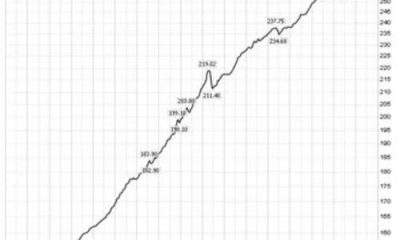Economics
The Role of Luck
Never forget Lady Fortuna’s influence: Good decisions can turn out poorly due to bad luck, and it is equally possible for terrible decisions to work out…

Skill and hard work are essential, but never forget Lady Fortuna’s influence
“Again I saw that under the sun the race is not to the swift, nor the battle to the strong, nor bread to the wise, nor riches to the intelligent, nor favor to the skillful; but time and chance happen to them all. For no one can anticipate the time of disaster. Like fish taken in a cruel net, and like birds caught in a snare, so mortals are snared at a time of calamity, when it suddenly falls upon them.”
It is tempting to attribute success to hard work and failure to bad luck, but the reality is that luck exerts both positive and negative influences on the human experience. It is certainly possible to make very good decisions that turn out poorly due to bad luck, and it is equally possible for terrible decisions to work out well due to good luck. Arguably, the latter is far more damaging in the long run.
In the field of investing, sequence of events counts for a great deal, and I would argue that experiencing early success might turn out to be unlucky in the long run. This is because early success can fool us into thinking that the result came from skill when it really came from luck. As confidence grows, without any real justification, it is easy to make larger and larger bets using faulty logic before the eventual denouement shatters the illusion. Russian roulette can yield favorable results for a while.
The destruction of the FTX crypto exchange this weekend has dominated headlines, and has negative implications for the entire cryptocurrency “ecosystem” which is ultimately dependent on the confidence of market participants who are trading assets that have no cash flow and cannot be valued using traditional methods.
For those of us who have avoided the cryptocurrency field in recent years, it is tempting to fall into a self-congratulatory mode as we witness the wreckage, even engaging in some schadenfreude as the chaos continues. But aside from it being in poor taste to take pleasure in the pain of others, we should stop to think about the lucky influences in our lives that shaped our investment approach.
Someone on Twitter asked people to name the book that most influenced their investing approach. I responded by naming Roger Lowenstein’s Buffett: The Making of an American Capitalist and Benjamin Graham’s The Intelligent Investor. There is nothing particularly original or insightful about naming these books, but there is more to the story that I think illustrates the role of luck, at least in my case.
I graduated from college in June 1995 with a finance degree and aspirations to work in the investing field, although I had no real idea of what I wanted to do other than to make a lot of money. I was unemployed for a few months before landing a poorly paying job doing work that barely required a college education and had nothing to do with investing. During my months of unemployment, Roger Lowenstein’s book was released and I read it over a few days. I soon read Benjamin Graham’s books as well.
Although Warren Buffett was a familiar name, my investing courses in college barely mentioned him and I had no understanding of the value investing principles that had built Berkshire Hathaway over thirty years. Mr. Buffett was 65 years old and seemingly at the end of his career (little did we know …). I drew inspiration from the biography and immersed myself in value investing and Berkshire’s annual reports. I was hooked.
By 1996, I switched to much better paying work in software after reading a few books on programming and learning to write code. The Silicon Valley had a hot market for computer programmers and the dot com boom was just getting started. I was immersed in that culture for the rest of the decade as company after company went public and ordinary people started making fortunes. Speculation was rampant — the dot com boom was my generation’s version of the cryptocurrency bubble.
I don’t remember how I came across Roger Lowenstein’s biography of Warren Buffett but I suspect it was in the course of browsing my local bookstore during the summer of 1995 when I was unemployed. Why did I pick up that book rather than many others that could have led me in a different direction? I knew about Warren Buffett, but he was never covered in my finance classes in college. Picking up that book was lucky.
If Roger Lowenstein had not published his book in the summer of 1995, chances are that I would never have learned about Warren Buffett, read Benjamin Graham’s writing, or bothered to read Berkshire Hathaway’s annual reports. By default, my finance background coupled with my exposure to the dot com world would have led me to speculate. The fact that I didn’t get involved in speculating was due to luck.
I will give myself some credit for hanging out in bookstores during that summer rather than engaging in pointless activities or feeling sorry for myself. I was trying to improve myself and engage in productive activities. I was open to the message when it arrived, and I followed up by immersing myself in value investing. But that initial spark was nothing but pure luck.
When we consider the young people who engaged in speculation in cryptocurrencies, we should be aware of the fact that most of them did not receive any financial education in school and they have been constantly bombarded with marketing messages related to cryptocurrency in general and trading platforms like FTX in particular, including endorsements by numerous celebrities.
I believe in personal responsibility and, ultimately, most people probably knew that they were gambling. Still, the entire situation had the aura of respectability in much the same way as the dot com bubble over two decades ago. In the case of FTX, customers are likely to lose money due to outright fraud rather than losses on the underlying securities they owned. Regulators failed to do their jobs. The system failed.
It is easy to feel puffed up about avoiding financial debacles in particular or bad luck in general, but we should always remember that past success has an element of luck even if principally due to hard work and effort.
There are forks in the road that can have a major influence on long-term outcomes. From a financial perspective, I was lucky enough to be influenced by the right people and principles at exactly the right time in my life.
Copyright and Disclaimer
Nothing in this newsletter constitutes investment advice and all content is subject to the copyright and disclaimer policy of The Rational Walk LLC.
Your privacy is taken very seriously. No email addresses or any other subscriber information is ever sold or provided to third parties. If you choose to unsubscribe at any time, you will no longer receive any further communications of any kind.
The Rational Walk is a participant in the Amazon Services LLC Associates Program, an affiliate advertising program designed to provide a means for sites to earn advertising fees by advertising and linking to Amazon.com.
Individuals associated with The Rational Walk own shares of Berkshire Hathaway.

Argentina Is One of the Most Regulated Countries in the World
In the coming days and weeks, we can expect further, far‐reaching reform proposals that will go through the Argentine congress.
Crypto, Crude, & Crap Stocks Rally As Yield Curve Steepens, Rate-Cut Hopes Soar
Crypto, Crude, & Crap Stocks Rally As Yield Curve Steepens, Rate-Cut Hopes Soar
A weird week of macro data – strong jobless claims but…
Fed Pivot: A Blend of Confidence and Folly
Fed Pivot: Charting a New Course in Economic Strategy Dec 22, 2023 Introduction In the dynamic world of economics, the Federal Reserve, the central bank…




















